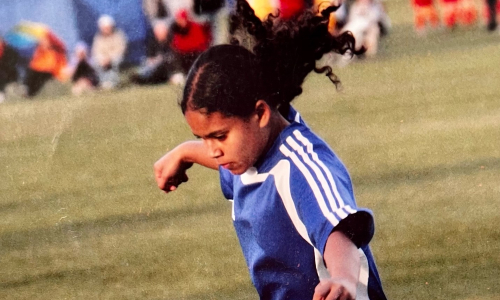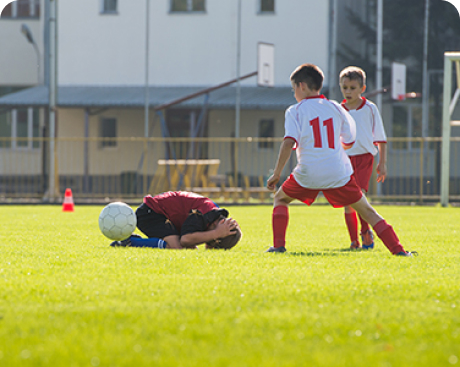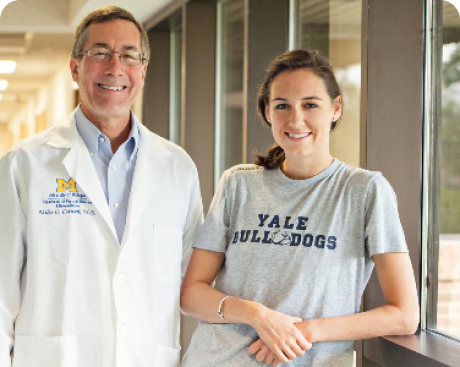Sasha Pina is a former soccer player who had to give up the sport after a career-ending concussion in 2010. For more than 13 years, she has lived with symptoms of Post-Concussion Syndrome (PCS), including headaches, memory problems, and seizures. Sasha’s recovery journey has been a roller coaster of ups and downs, looking for answers and trying new treatments. Through it all, she has found healing in helping others and adapting to her new normal. Below, Sasha shares her Inspiring Story.

My name is Sasha Pina, and for the past 13 years, I’ve been living with Post-Concussion Syndrome (PCS).
During a Labor Day weekend soccer tournament in 2010, I had a career-ending concussion. As I jumped up to head the ball, an opposing player elbowed me on the right side of the head, and I passed out mid-air. As I was landing, my head hit the ground and I was knocked unconscious. I was quickly admitted to the pediatric ICU where I stayed for four days. While there, my mom found out I had a grade 3 concussion, in addition to a lateral skull fracture, brain swelling, severe amnesia, photophobia, and loss of peripheral vision in my right eye. What we didn’t know was how much help I would need when it came to remembering certain things, and that this journey was far from over.
I took up soccer when I was 7 years old and played all the way through club and high school until the age of 16. The game was my passion, and I had dreams of playing in college and hopefully as a professional. I even had a college scout. I was that determined. In all my years of playing, I experienced multiple concussions but played through the headaches because I didn’t want to be sidelined. I thought they would go away on their own. But I have learned not all headaches are really “just headaches.” Sometimes it was hard to get up, but I still continued to play. I knew what concussions were but didn’t take them seriously. I don’t recall taking any classes or hearing coaches talk to us about head injuries.

With this last concussion, I had throbbing headaches that wouldn’t go away. It felt like they were never-ending, and they would sometimes even keep me up during the night. I also had memory problems, trouble finding my words, mood swings, balance issues, and trouble with concentration. During school, I had to limit my time to half-days for my brain to rest, and I was told to avoid physical activity. My friends were constantly asking why I was leaving so early. I spent six months in an extensive brain injury rehabilitation center doing physical therapy, occupational therapy, and speech therapy. Over the years my PCS symptoms got better, but now I live with other aftereffects, including seizures that started about 10 months post-injury.
In July of 2011, I was diagnosed with epilepsy after having my first seizure during a church service. I have focal aware and focal unaware seizures coming from my left temporal lobe. I take multiple medications to treat them, some working better than others. But the side effects cause me to get tired easily and struggle with memory, making certain days challenging. Fortunately, I have learned coping skills to help on tough days, and I always have amazing support from my mom no matter the situation. In February 2016, I had a device surgically implanted called a vagus nerve stimulator (VNS), a pacemaker-like device in the left side of my chest with a wire that wraps around the vagus nerve. The VNS sends electrical stimulations to my brain to prevent abnormal brain activity which can cause a seizure. It has been life-changing, and we also noticed it helping with some of my other symptoms. My seizures have come to a point where we are currently seeking other treatment at UCLA.

Life has been a roller coaster with quite a bit of ups and downs, looking for answers, going to doctors (neurologists, epileptologists, PTs, OTs, neuro-ophthalmologists), and hoping the next day, week, or even month will be better than the last. You never think how playing the game you love can end in the snap of a finger and change your life. And not just me, but the lives of everyone around me. I have lost friends because it was hard for them to see me the way I was, so they just left. Luckily, I gained some new friends, as well.
I have always been one to share my story with anyone that asks, since you never know who you can help. I am a huge advocate for brain injury and epilepsy awareness, and I am involved with a few amazing foundations. I’m an ambassador for the Danny Did Foundation, which spreads awareness for seizure detection devices and awareness on Sudden Unexpected Death in Epilepsy (SUDEP). I’m an ambassador for VNS Therapy, where I tell others about my journey with a VNS. And I also work for the Hundley Foundation, where we help families living with epilepsy and other disabilities.
I was always told that time heals all wounds. I have learned it might not heal the way you want it to, but in time, it will heal, and you will learn to adapt to your “new normal.” Take your time to recover — no one is rushing you. Focus on the good, as any progress is something to celebrate. Make sure to have a strong support system of family and friends; I wouldn’t be where I am today without them. As hard as sharing my story has been at times throughout the years, it has helped me in my healing while also being helpful to others. Take it one day at a time. Remember, you are doing the best you can! If you think someone has a concussion, encourage them to tell their coach or parents, go to the doctor, and take the time to heal.

